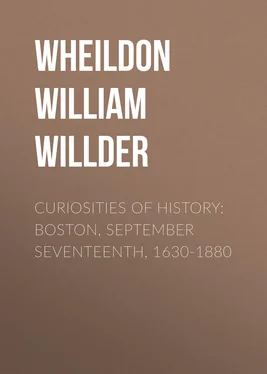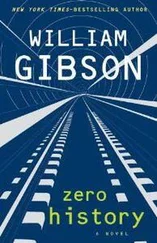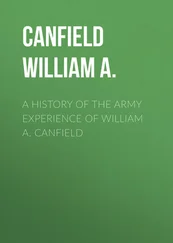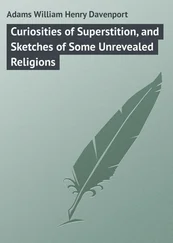William Wheildon - Curiosities of History - Boston, September Seventeenth, 1630-1880
Здесь есть возможность читать онлайн «William Wheildon - Curiosities of History - Boston, September Seventeenth, 1630-1880» — ознакомительный отрывок электронной книги совершенно бесплатно, а после прочтения отрывка купить полную версию. В некоторых случаях можно слушать аудио, скачать через торрент в формате fb2 и присутствует краткое содержание. Жанр: Путешествия и география, История, foreign_edu, foreign_antique, foreign_prose, на английском языке. Описание произведения, (предисловие) а так же отзывы посетителей доступны на портале библиотеки ЛибКат.
- Название:Curiosities of History: Boston, September Seventeenth, 1630-1880
- Автор:
- Жанр:
- Год:неизвестен
- ISBN:нет данных
- Рейтинг книги:4 / 5. Голосов: 1
-
Избранное:Добавить в избранное
- Отзывы:
-
Ваша оценка:
- 80
- 1
- 2
- 3
- 4
- 5
Curiosities of History: Boston, September Seventeenth, 1630-1880: краткое содержание, описание и аннотация
Предлагаем к чтению аннотацию, описание, краткое содержание или предисловие (зависит от того, что написал сам автор книги «Curiosities of History: Boston, September Seventeenth, 1630-1880»). Если вы не нашли необходимую информацию о книге — напишите в комментариях, мы постараемся отыскать её.
Curiosities of History: Boston, September Seventeenth, 1630-1880 — читать онлайн ознакомительный отрывок
Ниже представлен текст книги, разбитый по страницам. Система сохранения места последней прочитанной страницы, позволяет с удобством читать онлайн бесплатно книгу «Curiosities of History: Boston, September Seventeenth, 1630-1880», без необходимости каждый раз заново искать на чём Вы остановились. Поставьте закладку, и сможете в любой момент перейти на страницу, на которой закончили чтение.
Интервал:
Закладка:
1659, Oct. 20.—As the people were returning from the execution of Robinson and Stevenson [Quakers], the draw of the drawbridge fell upon a crowd of them, mortally wounding a woman, and severely hurting several others.
1691, August.—A fire broke out on Saturday evening, “consuming about fourteen houses, besides warehouses and brue houses from the Mill Bridgh down half way to the Draw Bridgh.”
1698, Nov. 6.—Mr. James Russell of Charlestown and Mr. John Ballentine of Boston, or “whoever else may be concerned, or owners of the bridge over the Mill Creek, are ordered forthwith to repair the pavement on each side of the bridge, and to move the gutters beside it, that it might be passable for horse and cart, according to the grant of the Town, or pay 20 s. a week till it should be done.”
1712, March 10.—Ordered to make the draw-bridge (so called) in Ann Street a fast, firm bridge the width of the street. A committee was appointed to inquire if any damage be sustained by anybody in making the bridge in question a “fast bridge.”
The Mill Pond was formed by the building of a causeway across the head of the cove, as the street now runs, where there was, it would seem, a sort of Indian causeway, or pathway, at some prior time. It is represented by writers on the subject to have been built from Leverett Street to the Charlestown Ferry; but as this would include the creek, built some ten or twelve years before, this seems to be impossible; for if the creek was connected with the pond, without a gate to shut it off, there could be no mill-power. The creek, therefore, must have been separated from the pond by a gate, while there was a gate from the pond into Charles River.
However, the causeway was built, and the mill-pond and the water-power it furnished, used for more than a hundred years without any special publicity or inquiry concerning them. In fact, it would seem as if the subject, and the large piece of territory involved, had been pretty much forgotten; so that in 1765, in March, a committee was appointed to inquire “by what terms the mill-owners held the mill-pond mills.” In May following, this committee reported, that on the 31st of July, 1643, there was granted to Henry Simons, George Burden, John Hill, and their partners, all the cove on the north-west side of the causeway leading towards Charlestown, with all the salt marsh bordering thereupon, not formerly granted, on these conditions: that within three years they erect thereon one or more corn-mills, “and maintain the same forever; also make a gate ten feet wide to open with the flood for the passage of boats into the cove,” &c. This gate was also to be “maintained forever.”
The Mill Pond, it is said, included about fifty acres,—nearly as large as the north end island,—and, of course, must have furnished during the time it was available—from an hour or two after full tide until an hour or two before the next tide, night and day—a very large and extensive water-power, and was, no doubt, though probably not half used, a very valuable property.
It is stated by Drake, as if it were a consequence of the action of the committee, that, “four years after the above report, a committee took possession of the premises, as having reverted to the town.” These proceedings, it will be noticed, all refer to the “mill-pond mills,” but may be presumed to include the pond and the whole grant made in 1643; so that in 1769 the property was in the hands of the town, as appears from these statements.
After this time, by some means or other, the Mill Pond Company, or Corporation, came into possession of the property, as Shaw says, “for the consideration of five dollars;” and in 1807, the town became a partner in the matter of tilling it up, the town to have the streets, we presume, and one-eighth of the lots filled within twenty years. Permission was also given to use the gravel of Beacon Hill for the purpose. The filling was completed more than fifty years ago, and the entire space has long been covered with buildings, and in 1832 included a theatre. The Boston and Maine Railroad Station stands over the creek; and the large depot buildings of the Fitchburg, Eastern, and Lowell Railroads are all on land taken from the river outside the ancient causeway: so that no one of the great railroad depots in the city stands upon the original land of the town.
Thus we have seen what were the features and topographical characteristics of the original peninsula which forms the groundwork, as it were, of the city proper of to-day. In the steady march of progress and improvements which have marked its growth for two hundred and fifty years, such changes and enlargements have been made, that neither its early outlines or its original shape are any where to be observed. The great coves on either side of the town have disappeared; and the renowned Tri-mountain, around which so much of history gathered, and so much of puritanism and patriotism were enshrined, is shorn of its ancient prestige, although still, as it were, the summit of State authority; and of “Corne Hill,” whereon the settlers of Boston, Charlestown, Roxbury, and Dorchester, in 1632, built the first fort for the defence of the settlement, not a vestige now remains.
Yet, broad and extensive as these improvements and enlargements of the original peninsula have been, they are at least equalled, if not exceeded, by what has been accomplished in other parts of the town; so that Boston proper—at first two islands, or nearly so, and afterwards a peninsula—has long ceased to be either the one or the other, and must now be regarded as a portion of the mainland. And this, too, while Charles River, by encroachments upon its bed on both sides, the numerous wharves projecting into it, and the bridges, railroads, and other structures resting upon its bottom, has been reduced in its proportions to one-third of its original size, and, in fact, has almost ceased to be a river in the proper sense of that term. So also on the south side of the town: Four Point Channel, which reached to Dover-street bridge, is now a narrow stream; and the South Bay, which lay between Roxbury and South Boston, has been greatly reduced in its proportions, and is crossed by the New England Railroad. So that it may be said, the city proper to-day stands consolidated on one side of the ancient neck with Roxbury and Dorchester, and on the other with Roxbury and Brookline. There still remain, however, a section of Charles River, forming a bay of itself, between Boston, Cambridge, and Brookline, and a considerable portion of the South Bay between Roxbury and South Boston. Brookline—originally Muddy Brook—was formerly considered as belonging to Boston, and its lands were apportioned among the early settlers of the town for agricultural purposes and the keeping of cattle. It is now nearly surrounded by the enlarged city, Brighton and Roxbury both belonging to Boston.
There is, however, one feature of Boston which may be said to remain intact, and that is Boston Common. When the settlers bought the peninsula of William Blackstone, or all his interest in it, excepting six acres, which he reserved for his own occupation, “the town laid out a place for a training-field, which ever since and now is used for that purpose, and for the feeding of cattle.” This was undoubtedly the origin of Boston Common; and the date of the transaction, as appears from the town records, was on “the 10th daye of the 9th month, 1634,” which, as the year commenced with March, would be November, 1634. It has undergone many changes, some enlargement by filling up the marsh on the river side, and numerous improvements in its general appearance by laying out its malls and walks, setting out trees, excluding cattle, walling around Crescent Pond (formerly Frog Pond), introduction of the Cochituate water and fountains, and, last, by the erection of the Army and Navy Monument on its highest elevation, once occupied as a fortification against its rightful owners by Gen. Gage and Gen. Howe.
Читать дальшеИнтервал:
Закладка:
Похожие книги на «Curiosities of History: Boston, September Seventeenth, 1630-1880»
Представляем Вашему вниманию похожие книги на «Curiosities of History: Boston, September Seventeenth, 1630-1880» списком для выбора. Мы отобрали схожую по названию и смыслу литературу в надежде предоставить читателям больше вариантов отыскать новые, интересные, ещё непрочитанные произведения.
Обсуждение, отзывы о книге «Curiosities of History: Boston, September Seventeenth, 1630-1880» и просто собственные мнения читателей. Оставьте ваши комментарии, напишите, что Вы думаете о произведении, его смысле или главных героях. Укажите что конкретно понравилось, а что нет, и почему Вы так считаете.












